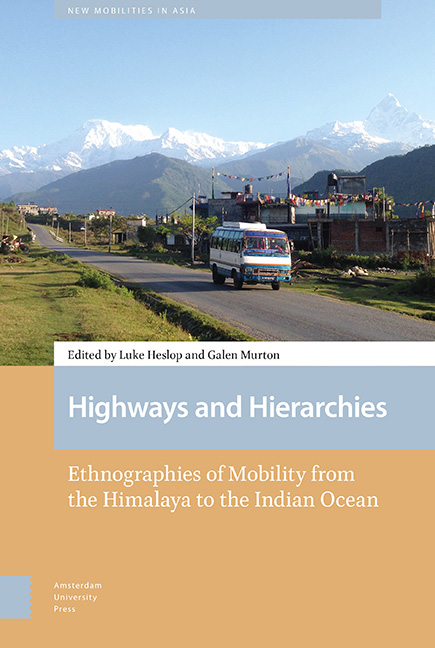Book contents
- Frontmatter
- Contents
- List of figures
- Acknowledgements
- Preface: Thinking with roads
- 1 Why highways remake hierarchies
- 2 Stuck on the side of the road: Mobility, marginality, and neoliberal governmentality in Nepal
- 3 A road to the ‘hidden place’: Road building and state formation in Medog, Tibet
- 4 Dhabas, highways, and exclusion
- 5 The edge of Kaladan: A ‘spectacular’ road through ‘nowhere’ on the India-Myanmar borderlands
- 6 The making of a ‘new Dubai’: Infrastructural rhetoric and development in Pakistan
- 7 Encountering Chinese development in the Maldives: Gifts, hospitality, and rumours
- 8 Roads and the politics of thought: Climate in India, democracy in Nepal
- Authors notes
- Index
2 - Stuck on the side of the road: Mobility, marginality, and neoliberal governmentality in Nepal
Published online by Cambridge University Press: 13 November 2021
- Frontmatter
- Contents
- List of figures
- Acknowledgements
- Preface: Thinking with roads
- 1 Why highways remake hierarchies
- 2 Stuck on the side of the road: Mobility, marginality, and neoliberal governmentality in Nepal
- 3 A road to the ‘hidden place’: Road building and state formation in Medog, Tibet
- 4 Dhabas, highways, and exclusion
- 5 The edge of Kaladan: A ‘spectacular’ road through ‘nowhere’ on the India-Myanmar borderlands
- 6 The making of a ‘new Dubai’: Infrastructural rhetoric and development in Pakistan
- 7 Encountering Chinese development in the Maldives: Gifts, hospitality, and rumours
- 8 Roads and the politics of thought: Climate in India, democracy in Nepal
- Authors notes
- Index
Summary
Abstract
This chapter examines rural road development in Nepal to understand how the purported benefits of new transport mobilities in fact reinforce longstanding social hierarchies, create conditions for the consolidation of centralized elite power and capital accumulation, and reproduce terms of marginality and precarity for vulnerable populations in highland Nepal. The authors posit that road development in Nepal functions as a ‘liberal mode of governance’ (Duffield 2008) whereby both private and public actors territorialize national space and articulate a new but still uneven future for Nepal. More broadly, this chapter aims to illuminate how non-state actors working in peripheral and rural regions – such as transport syndicates and development contractors in Nepal – help to materialize the capitalist and bureaucratic objectives of central state authorities through liberal practices of infrastructure development.
Keywords: Nepal, mobility, marginality, governmentality, neoliberalism
Introduction
This chapter examines rural road development in Nepal to understand how the purported benefits of new transport mobilities in fact reinforce longstanding social hierarchies, create conditions for the consolidation of centralized elite power and capital accumulation, and reproduce terms of marginality and precarity for vulnerable populations in highland Nepal. On the basis of our primary research and analysis in three districts of Nepal – Kavre, Mugu, and Mustang – we argue that road systems and the intersecting circumstances of mobility injustice and political economy that they generate reproduce terms of social stratification for many of the purported targets of ‘rural development’. Drawing from Marxist and poststructuralist critiques of the uneven economic outcomes and class/caste -delineated power asymmetries generated by infrastructure development (Blaikie et al. 1976) and neoliberal governmentality (Ferguson and Gupta 2002), this chapter posits that road development in Nepal functions as a ‘liberal mode of governance’ (Duffield 2008) whereby both private and public actors simultaneously territorialize national space, accumulate capital, and maintain power.
This collaborative study was inspired by two succinct but loaded phrases that we heard in Mustang and Mugu districts of Nepal between 2015 and 2017: ‘If you are poor, the road makes you [feel] poorer’ (Nep. Yedi tapai garib hunuhunchha bhane sadakle jhan garib bhayejasto anubhuti garaauchha) and ‘To travel by bus is like buying one's own death ticket’ (Nep. Busma hidnu bhaneko paisa tirera kaal kinnu jastai ho).
- Type
- Chapter
- Information
- Highways and HierarchiesEthnographies of Mobility from the Himalaya to the Indian Ocean, pp. 39 - 68Publisher: Amsterdam University PressPrint publication year: 2021



